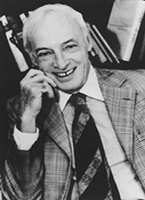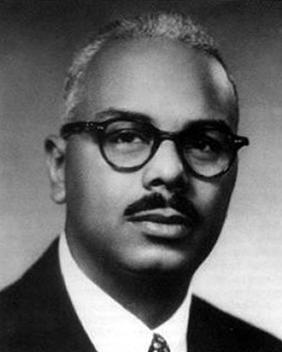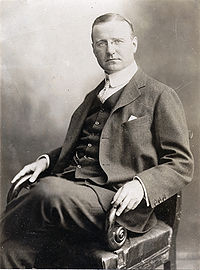
John A. Jakle
Born: 1939 in Terre Haute, Indiana
Connection to Illinois: Jakle lives in Central Illinois. Biography: John A. Jakle is an emeritus professor of geography and landscape architecture at the University of Illinois at Urbana-Champaign.
Awards:
Website: http://www.geog.illinois.edu/people/jakle/index.html
on WorldCat: http://www.worldcat.org/search?q=john+a+jakle
Selected Titles
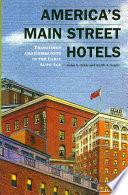 |
America's main street hotels : ISBN: 1572336552 OCLC: 298777015 University of Tennessee Press, Knoxville : ©2009. |
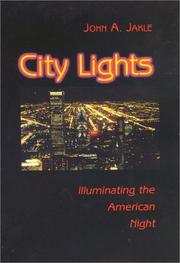 |
City lights : ISBN: 080186593X OCLC: 44934113 Johns Hopkins University Press, Baltimore : ©2001. "Today's cities shine brightly at night, illuminated by millions of street lamps, neon signs, and incandescent and fluorescent bulbs burning in the windows of office blocks, apartment buildings, and homes. Indeed, the modern city is in large part defined by this brilliance. In contrast, cities before the end of the nineteenth century were dominated by shadows and darkness, their oil lamps mostly ineffectual against the night. The introduction of modern lighting technologies in the 1870s - at first natural gas and later electricity - transformed urban life in America and around the world." |
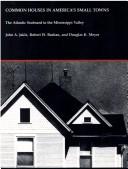 |
Common houses in America's small towns : ISBN: 0820310743 OCLC: 16645344 |
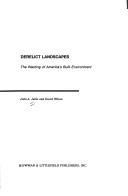 |
Derelict landscapes : ISBN: 0847677354 OCLC: 25551837 Rowman & Littlefield, Savage, Md. : ©1992. |
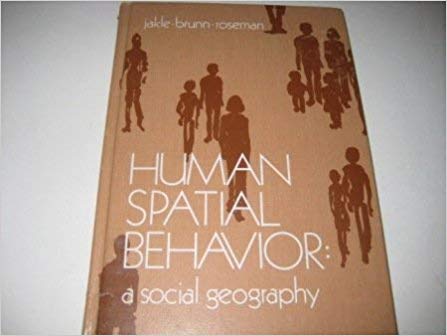 |
Human spatial behavior : ISBN: 0881331414 OCLC: 2219648 Duxbury Press, North Scituate, Mass. : ©1976. |
 |
Images of the Ohio Valley : ISBN: 0195022408 OCLC: 3034346 Oxford University Press, New York : 1977. |
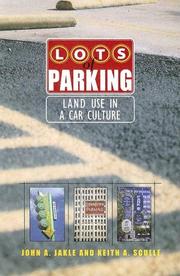 |
Lots of parking : ISBN: 0813925193 OCLC: 53138536 University of Virginia Press, Charlottesville : 2004. "Lots of Parking examines a neglected aspect of this rise of the automobile : the impact on America not of cars in motion but of cars at rest. While most studies have tended to focus on highway construction and engineering improvements to accommodate increasing flow and the desire for speed, John A. Jakle and Keith A. Sculle examine a fundamental feature of the urban, and suburban, scene - the parking lot. Their exploration traces the history of parking from the curbside to the rise of public and commercial parking lots and garages and the concomitant demolition of the old pedestrian-oriented urban infrastructure. In an accessible style enhanced by a range of illustrations, Jakle and Sculle discuss the role of parking in downtown revitalization efforts and by contrast, its role in the promotion of outlying suburban shopping districts and its incorporation into our neighborhoods and residences." "Like Jakle and Sculle's earlier works on car culture, Lots of Parking will fascinate professional planners, landscape designers, geographers, environmental historians, and interested citizens alike."--Jacket. |
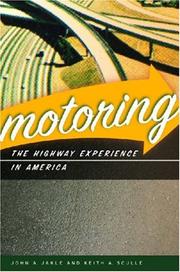 |
Motoring : ISBN: 9780820330280 OCLC: 138341426 Motoring unmasks the forces that shape the American driving experience--commercial, aesthetic, cultural, mechanical--as it takes a timely look back at our historically unconditional love of motor travel. Focusing on recreational travel between 1900 and 1960, John A. Jakle and Keith A. Sculle cover dozens of topics related to drivers, cars, and highways and explain how they all converge to uphold that illusory notion of release and rejuvenation we call the open road. Jakle and Sculle have collaborated on five previous books on the history, culture, and landscape of the American road. Here, with an emphasis on the driver's perspective, they discuss garages and gas stations, roadside tourist attractions, freeways and toll roads, truck stops, bus travel, the rise of the convenience store, and much more. All the while, the authors make us think about aspects of driving that are often taken for granted: how, for instance, the many lodging and food options along our highways reinforce the connection between driving and freedom and how, by enabling greater speeds, highway engineers helped to stoke motorists' blessed fantasy of flight. Although driving originally celebrated freedom and touted a common experience, it has increasingly become a highly regulated, isolated activity. The motive behind America's first embrace of the automobile--individual prerogative--still substantially obscures this reality. Americans did not have the automobile imposed on them, say the authors. Jakle and Sculle ask why some of the early prophetic warnings about our car culture went unheeded and why the arguments of its promoters resonated so persuasively. Today, the automobile is implicated in any number of environmental, even social, problems. As the wisdom of our dependence on automobile travel has come into serious question, reassessment of how we first became that way is more important than ever. |
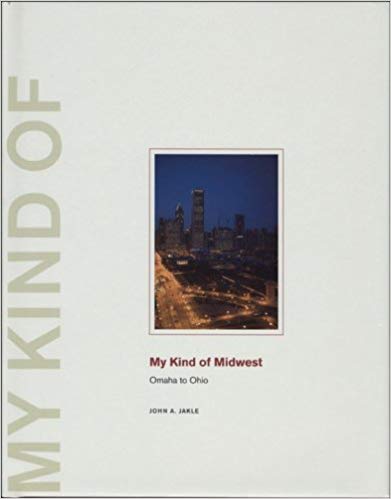 |
My kind of Midwest : ISBN: 1930066872 OCLC: 225876160 Center for American Places at Columbia College Chicago : Chicago, Ill. : 2008. ""Will it play in Peoria?" That question-only half-joking-hovers over everything from politics to television, an acknowledgment that the Midwest is to many the most emblematic region of the United States today. Stereotypes both good and bad abound about Midwesterners, but, in this incisive yet poignant narrative, John Jakie reveals a rich and telling portrait of the contemporary Midwest and its people. In engaging prose that is supplemented by a captivating gallery of photographs and postcards, Jakie chronicles his life in the Midwest, from childhood to his current professional life. Interweaving the personal with a look at the region's geographic and cultural history, My Kind of Midwest reveals that the region is more than just a group of "flyover states:' Jakie tells an engaging story that recounts his youthful explorations of the flourishing cities of Detroit and Chicago; the rapid growth and importance of gateway cities such as Omaha, Kansas City, and Cincinnati along the Ohio, Mississippi, and Missouri rivers; and the integral role of tourism to Midwestern states' economies. He also explores how the study of human geography enhances our ability to understand any place or region." "An intimate and compelling narrative of one man's connection to the American landscape, My Kind of Midwest will be essential reading for all those with ties to the heartland."--Jacket. |
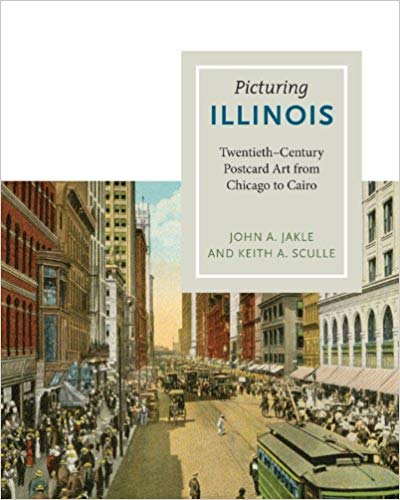 |
Picturing Illinois : ISBN: 9780252080906 OCLC: 864844788 University of Illinois Press, Urbana : 2012. |
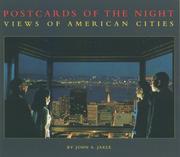 |
Postcards of the night : ISBN: 0890134561 OCLC: 51937008 Museum of New Mexico Press in association with the Center for American Places, Santa Fe : ©2003. |
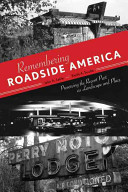 |
Remembering Roadside America : ISBN: 1572338237 OCLC: 775873033 University of Tennessee Press, Knoxville : 2011. The use of cars and trucks over the past century has remade American geography - pushing big cities ever outward toward suburbanization, spurring the growth of some small towns while hastening the decline of others, and spawning a new kind of commercial landscape marked by gas stations, drive-in restaurants, motels, tourist attractions, and countless other retail entities that express our national love affair with the open road. By its very nature, this landscape is ever changing, indeed ephemeral. What is new quickly becomes old and is soon forgotten. In this absorbing. |
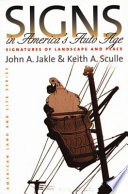 |
Signs in America's auto age : ISBN: 9781587294822 OCLC: 66385186 University of Iowa Press, Iowa City : ©2004. Signs orient, inform, persuade, and regulate. They help give meaning to our natural and human-built environment, to landscape and place. In Signs in America's Auto Age, cultural geographer John Jakle and historian Keith Sculle explore the ways in which we take meaning from outdoor signs and assign meaning to our surroundings-the ways we read landscape. With an emphasis on how the use of signs changed as the nation's geography reorganized around the coming of the automobile, Jakle and Sculle consider the vast array of signs that have evolved since the beginning of the twentieth century. |
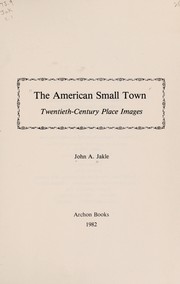 |
The American small town : ISBN: 0208019197 OCLC: 7576846 Archon Books, Hamden, Conn. : 1982. |
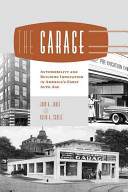 |
The garage : ISBN: 9781572339583 OCLC: 833380725 Beginning with the days when only the wealthy could afford cars (and their chauffeurs doubled as mechanics), the authors show how blacksmiths and carriage repairmen quickly adapted to the increasing ubiquity of the automobile. Noting differences from region to region as well as between large cities and smaller population centers, they look at the growth of car dealerships, with their separation of service and sales floors, and the parallel rise of small, independent repair shops; businesses that have steadily disappeared from the national scene, though some of the buildings that once housed them have survived, refitted for other purposes. The domestic garage; first conceived as a detached structure, then integrated with the house itself; also gets its own chapter. And throughout, the authors explore the various ways in which concerns with practicality, commerce, and aesthetics have dictated how garages were laid out and constructed and what services they offered. |
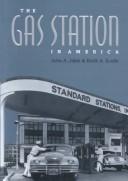 |
The gas station in America / ISBN: 0801847230 OCLC: 28927327 Johns Hopkins University Press, Baltimore : ©1994. "Why were early gas stations built to resemble English cottages and Greek temples? How does Teddy Roosevelt's busting of the Standard Oil Trust in 1911 relate to the lack of Exxon and Chevron stations in the Midwest today? What corporate decisions and economic pressures lay behind the Bauhaus-inspired stations of the 1930s? Is there a link between feminism and the rise of the Gas'n'Go-style convenience store? What have gas stations symbolized in the American experience?" "Geographer John Jakle and historian Keith Sculle have teamed up to write a unique and comprehensive history of the American gas station - its architecture, its place in the landscape and in popular culture, and its economic role as the most visible manifestation of one of the country's largest industries. Here is the definitive book on the subject, from the first curbside filling stations - with their juryrigged water tanks and garden hoses - to the nationwide chains of look-alike stations whose design pioneered the "place-product-packaging" concept copied by motels and fast-food restaurants." "Jakle and Sculle begin with a look at how the gas station evolved in response to America's growing mobility. They describe the oil company marketing strategies that led to the familiar brand names, logos, uniforms, and station designs that came to dominate the nation's highways. They explain why certain companies and their stations thrived in certain regions while others failed. And they document the reasons for the gas station's abrupt decline in recent decades." "Illustrated with more than 150 photos and drawings - of gas stations, vintage advertisements, maps, and memorabilia - the book offers a wealth of information and colorful details." |
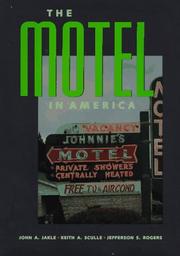 |
The motel in America / ISBN: 0801853834 OCLC: 34513125 Johns Hopkins University Press, Baltimore : 1996. "In The Motel in America, John Jakle, Keith Sculle, and Jefferson Rogers take an informative and entertaining look at the history, architecture, and business of motels in the United States. Like Jakle and Sculle's acclaimed The Gas Station in America, this book explores the effect on American culture as citizens became motorists. The new breed of automobile traveler rejected the hotels of the railroad era, which were located in congested downtown areas and lacked adequate parking. Instead, they came to favor the roadside lodgings outside city limits which came to be known as motels, a term first used in Arthur Heineman's Milestone Mo-tel, opened in San Luis Obispo, California, in 1926." "The popularity of motels grew steadily throughout the century, booming after the Second World War and reaching a peak in 1961, when there were some 61,000 motels operating throughout the country, the vast majority of them independently owned. These motels were an integral part of the American landscape, shaping their guests' ideas about modern living, introducing Americans to the consumer novelties of the age: color televisions, automatic coffee makers, shag rugs, even residential swimming pools. By the 1980s, most of the country's 40,000 motel establishments were affiliated with referral and franchise chains, reflecting the traveler's need for uniform quality and the entrepreneur's desire for regional or national recognition." "The history of the motel, from autocamp to franchise, has long been overlooked. Although motels have come to be taken for granted, they illustrate much that is central to the American experience. In The Motel in America, motels at last receive the careful interpretation they deserve."--Jacket. |
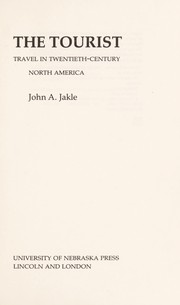 |
The tourist : ISBN: 0803275617 OCLC: 10507767 Surveys the tourist industry in the United States and Canada, looks at travel by rail, steamship, automobile, bus, and airplane, and explains what things attract tourists. |
 |
The visual elements of landscape ISBN: 0870235664 OCLC: 14719050 University of Massachusetts Press, Amherst : 1987. |


